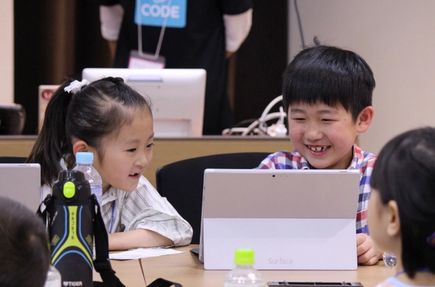WDLC
The project “MakeCode x micro:bit 200” initiative was developed to support programming education in Japanese schools, driven by Windows Digital Lifestyle Consortium (WDLC).

Children working together in Japan
Programming education will become compulsory in all Japanese primary schools in 2020. To prepare the required 400,000 teachers across 20,000 schools, many education programmes support programming education have been in development, driven through corporate, government and grassroots initiatives.
Programme design
Microsoft Japan, through the Windows Digital Lifestyle Consortium, supported elementary schools or school board groups with programming education by providing two hundred micro:bits to two hundred schools throughout Japan. The project was funded the The Future Learning Consortium.
These schools were also offered programming education lesson plans and sample code via MakeCode. By the end of the pilot, the micro:bit was distributed to all participating groups, with sets of lesson plans and code samples made available on the WDLC official site.
Impact and results
- More than 80% of schools participating in the Makecode x micro:bit 200 pilot had begun conducting programming education when the pilot took place
- The students who took part were mainly 5th to 6th graders (aged 7 - 8), and almost half worked with micro:bits devices for 3 hours or more on STEM topics
- Teachers answering the post-pilot survey cited three major issues in implementing programming education: lack of equipment, lack of environment and infrastructure and lack of information and training
- Building on the 200-school pilot, Microsoft & Lenovo are now working together with the Japanese Ministry of Education (MEXT) on a programme to include laptops, wifi infrastructure, teacher training and support as well as BBC micro:bit hardware